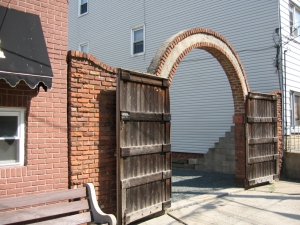415 Monroe Street, Hoboken, New Jersey

415 Monroe Street, Hoboken, New Jersey
I am standing in the most improbable spot in the world.
I am standing in a parking lot. It is a small gravelly space – room for only five or six cars if you were clever. It is nestled between two small buildings. One is an old row house – though not the classic Brooklyn brownstones we’ve seen in a thousand Hollywood backlot movies. This house, which is on the south side of the parking lot, is covered with vinyl siding. The one on the north is short and brickfaced, with tarpaper shingles facing the parking lot.
I look up the street again. The old Italian men on the street corners who have been watching me out of the corners of their eyes, look away again when I look at them. I believe they know why I have been walking up and down this nondescript street on this hot day, looking at door numbers, retracing my steps in confusion. Checking my notes. Because I cannot believe that there is an empty space here. There should be a house here. This is 415 Monroe Street and it is inconceivable to me that there would not be a house at 415 Monroe Street. Because this is where Frank Sinatra was born.
But there isn’t. And that’s because this house burned down in 1967. So I sit down on the park bench in front of 417, the short brick building that has become a sort of “replacement shrine” to Sinatra, and think. The most famous house in Hoboken, the birthplace of the most famous person Hoboken ever produced, burned down. This doesn’t make any sense to me. Because Sinatra’s birthplace should be like the Monticello or Mount Vernon of Hoboken. But where is it?
You could understand it, I suppose, if it didn’t seem so damn random. If it were merely some shortsighted developer who tore it down to install a monstrosity. Or the result of the widening of some inconsequential road. But a fire? Especially when you consider that Frank’s dad was a fireman.
I begin thinking about what this street was like in 1915 when Sinatra was born. Did New York City seem a world away, even though you could walk a dozen blocks east of here and look down from the cliffs and see Wall Street? Did Europe seem like another planet, though both Sinatra’s parents – and probably most of the parents of the kids he knew – had come from there to start over, somehow, here? Did the war over there, which we would join in two years time, did that seem even remotely real? Or did that vast ocean that separated us from Europe insulate everybody on this street?
For we were the backwater. The Hoboken – not even the Brooklyn – to Europe’s Manhattan. We were natural resources – oil and farming and whatever else we could make the land do. But we were not the place people looked for truth. We were not where the world looked for wisdom. The world looked at us the same way we look at the grocery store or the gas station today. And when Europe began it’s dance with death in the thirties and the intelligentsia came to these shores, they came here to escape. They came as generations before had come – for a mythology of promise that bore as little relation to us as dreams usually do. They came here to get away from Europe.
And then I began thinking about the Sinatra that I listen to. That fifties genius – the Nelson Riddle, Billy May, Gordon Jenkins arrangements. When Sinatra wasn’t just himself, he had become the voice of America. The America that was left standing after Europe had bombed itself into the stone age, and, for the second time in thirty years, destroyed it’s own youth and possibility. The America that woke up one morning and discovered that it was the super power; that it was the last great hope, the future. The America that felt that anything was possible. That felt that the rules had all changed and that we – you, me, the guy down the street – could do anything.
You can hear it in his voice, the way he swings around the beat – the phrasing that winks as if to say, yeah, you and me, we’re just average Joes, but you know what? We’re American Average Joes, and that’s the best thing there is. We’re the ones who built the bomb. Who freed Europe. Who invented nylon, for god’s sake. Who invented jazz. A voice of confidence. Of a fearlessness born not of ignorance, but fired in the twin kilns of the Depression and World War 2. Not the reassurance in a dark time that FDR had given them through the radio. But a bravado. A boldness. A self-possession that America felt and that the world had never seen before.
From this guy. This bobbysoxer hero. This only child of a wardheeler abortionist and a fireman. Who grew up to marry Ava Gardner and win an Oscar and pal around with presidents and retire to the palatial ranches of the Golden State.
You know, they used to claim that in Hoboken there was a bar on every corner. I look up and down this street, but I don’t see one. So I get up. I start walking in the general direction of Tennessee. Anybody want a drink?

Just passing by.Btw, your website have great content!
_________________________________
Making Money $150 An Hour
Thanks for the write up. The way you felt and reacted is EXACTLY how I would have, too. You would think Hoboken would at least rebuild a replica of the home of their famous son!